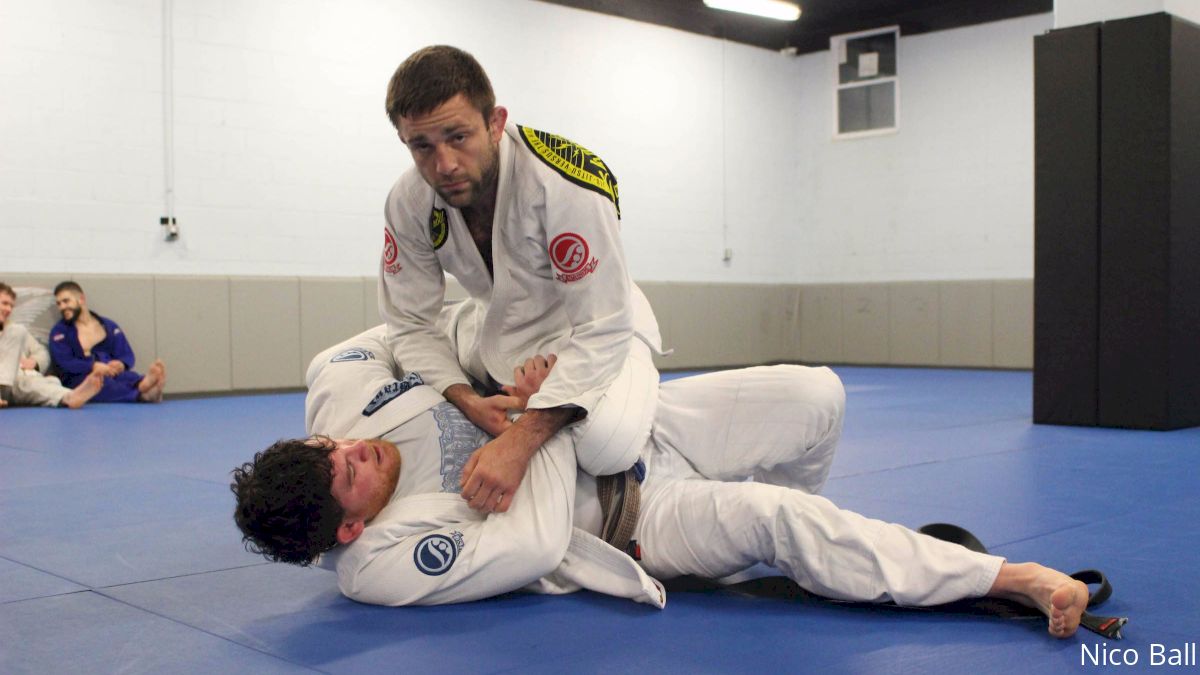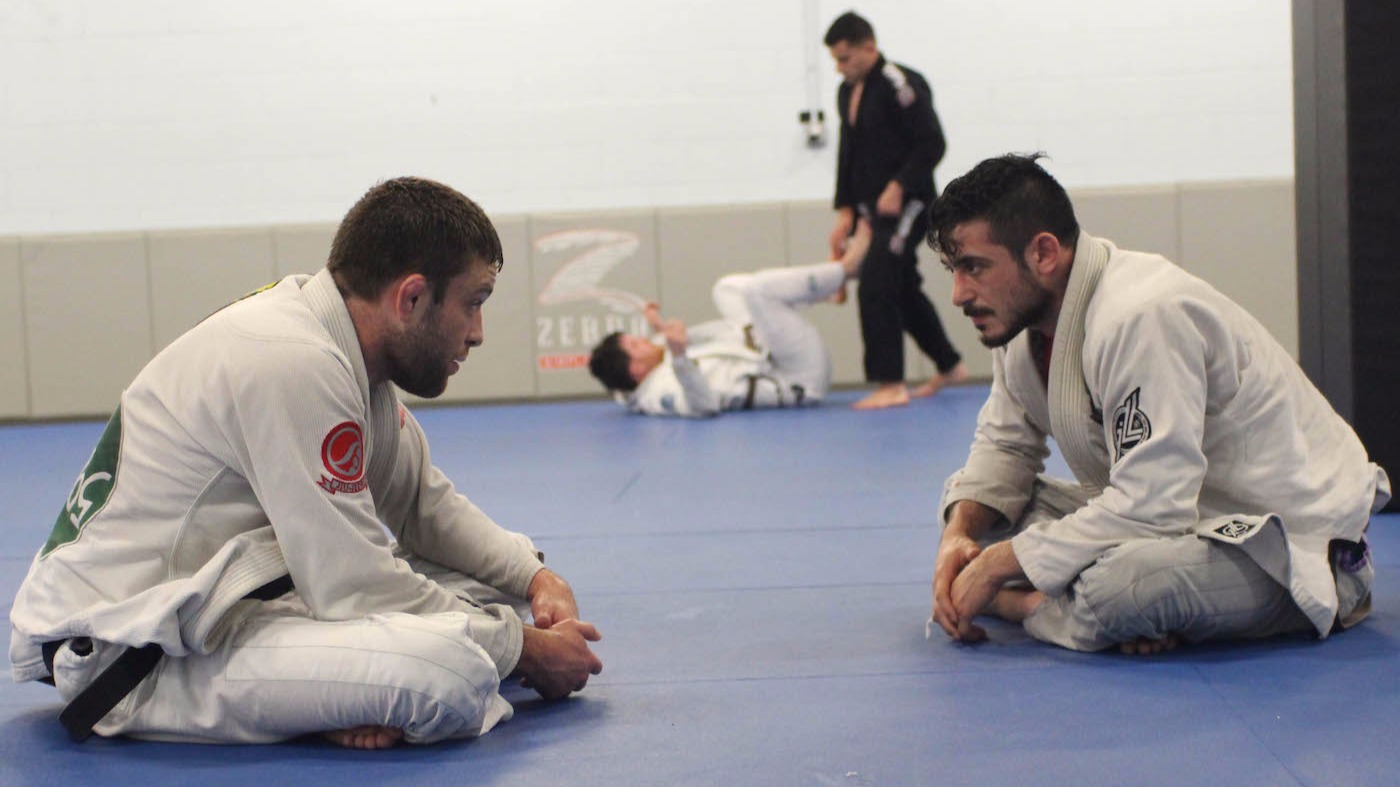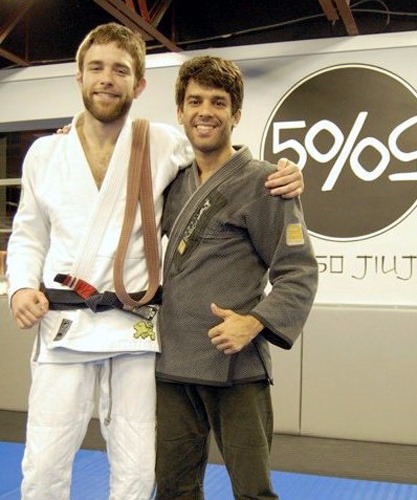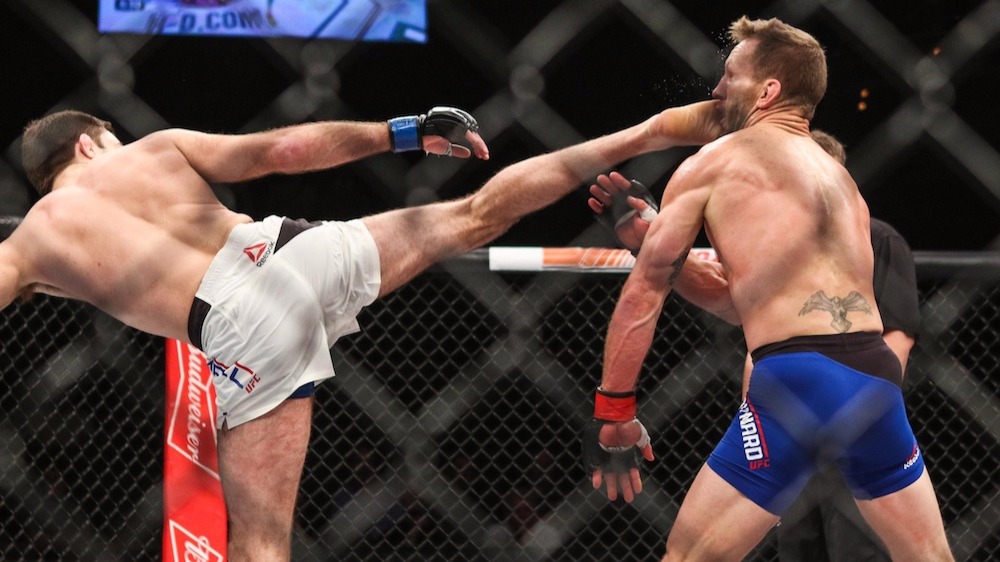Ryan Hall vs Jiu-Jitsu: Actions Speak Louder Than Words
Ryan Hall vs Jiu-Jitsu: Actions Speak Louder Than Words
Hall is someone that is constantly striving to be consistent with his own values as a martial artist, both on and off the mats.

Ryan Hall was up six points after nailing the takedown and securing the mount.
As his drunken opponent squirmed underneath him, Hall put his attention to the arm that he was calmly working into a kimura on the floor of the busy New Jersey restaurant where he and his friends had been enjoying dinner in December 2011.
After 10 minutes of video, a police intervention, and an awkward apology, jiu-jitsu prevailed and peace was finally restored to the restaurant. It was the perfect, unstaged, unintended demonstration of the application of jiu-jitsu in a real-life situation.
About Ryan Hall
Hall found jiu-jitsu in 2004 while studying electrical engineering in New York. His stay in the Big Apple was brief.
During the summer, after finding a jiu-jitsu academy in his hometown of Falls Church, Virginia. Hall decided to dedicate his life to martial arts. He left school (immediately), got a job cleaning mats, and never looked back. His start in the sport coincided with the end of his formal education, but that didn't mean he stopped learning.
Over the years, he has had the opportunity to train with big names such as Marcelo Garcia, Murilo Santana, and Bruno Frazatto.
His dedication to the sport has earned him a world title (purple, 2009), and gold medals in notable competitions such as No-Gi Worlds (purple, 2007), Europeans (purple, 2008), and Brazilian nationals (purple, 2008).
In 2012, he transitioned to MMA. He made a name for himself by winning The Ultimate Fighter 22, finishing one of his opponents with a heel hook from the 50-50 guard.
Hall became disillusioned with the direction jiu-jitsu is going. He decided to retire his gi and stick to MMA. You won't catch Hall scrapping in any more tournaments, but he is still influencing the jiu-jitsu community through his students. In addition to his own training, Hall is also running his 50/Fifty Academy in Falls Church while waiting for his next matchup with the UFC.
50/Fifty Academy
Open mat time: Hall walked in and stood on the perimeter surveying the students who were warming up and waiting for the session to begin. As usual, he politely greeted the people in his proximity, but you could tell his mind was somewhere else– something was bugging him.
It was a biker from earlier that afternoon: something about disturbing the peace with his radio and offending a little old lady before sliding into a nearby bar.
Hall was upset– not only because of the biker's dishonorable actions– but also because he never got the opportunity to express his opinion, face-to-face, about the biker's blatant violation of a perfectly peaceful afternoon. That's the kind of guy Hall is: direct. If he doesn't like something, he has no problem saying so.
Although capable of winning an epic street fight and then basking in the subsequent social media frenzy, Hall is not the kind of guy to go looking for attention. Instead, he decided to go to his gym and resolve his anger with loop chokes.
Although his focus is on training for his next potential fight in the UFC, Hall is just as dedicated to his students as he is to his own evolution.

Ryan Hall chats with Adam Benayoun. Photo: Nico Ball
Adam Benayoun, a brown belt under Marcelo Garcia, recently took a leap of faith and decided to move to Virginia to train with Hall at the 50/Fifty Academy. Benayoun felt that Hall had something unique to offer and he didn't want to forgo a golden opportunity, so he decided to leave New York.
"Ryan's understanding of the submission-oriented and flexible guard game made him a very good coach for me, and the opportunity to learn from him was something I didn't want to pass on," Benayoun says.
In the few months that Benayoun has been in at 50/Fifty, Hall has helped the budding brown belt navigate weaknesses that he was able to leave unaddressed at the lower belts. Hall's time in the UFC has pushed him to become a more well-rounded fighter with a focus on high-percentage techniques that are effective in a fight. Benayoun says he's already noted a substantial change in his stand up and leg attacks.
Perfecting the Process
When he set out to be a fighter, Hall didn't want to simply mirror the best, because that would make only him a lesser version of them. Instead, he adapted their strengths into his own unique style, which is what makes him such an innovative athlete and effective teacher.
"Having the right heroes is important," Hall says nostalgically. "I feel fortunate because training with Murilo Santana, Marcelo Garcia, and Bruno Frazzato were really life-altering experiences in my understanding of what's possible in martial arts and what a great grappler really is. I had no choice but to try to develop."
Felipe Costa is another notable name who has influenced Hall. The two met when Hall traveled to Rio for Brazilian Nationals, and they formed an instant friendship. After leaving Team Lloyd Irvin in 2009, Hall turned to Costa for guidance. They kept in touch over the years, and it was Costa who awarded Hall his black belt in 2010.

"The truth is, he was already phenomenal when I met him," Costa says. "I could see the importance he gave to learn every aspect of the game. He has a really good understanding of techniques and likes to break them down in such a way that his learning curve is better than most people."
Growing up, Hall was always fascinated by the intricacies of the different styles of martial arts, so he sought out the best training partners and teachers to spur his evolution. Often packing up and leaving the comforts of his home in Virginia to train with elite level wrestlers or with karate black belts, Hall was constantly seeking the best people to learn from, and now, he is working toward bringing more talented instructors and athletes to his own gym.
He's built a unique network of training partners at academies such as Tristar gym in Montreal with UFC veteran Georges St-Pierre, Upstate Martial owned by Stephen "Wonderboy" Thompson, and Beta Academy run by Nakapan Phungephorn in Washington D.C.
"I don't know when I'll fight again," Hall says. "But I feel very fortunate to have the people around me that I do, and I'm just doing my best to improve. I'm looking forward to facing the best challenges that the UFC can provide, and I know that they're out there so I'll be ready."
Hall most recently fought in December 2016, when he beat fellow featherweight Gray Maynard by decision. Hall is waiting for the phone to ring for his next matchup with the UFC.

Ryan Hall lands a spinning kick to the face of Gray Maynard at the UFC event TUF Tournament of Champions. Photo: Tracy Lee-USA TODAY Sports
Trash Talk vs. Technical Talent
Although he divides his time equally between gi, no-gi, and stand-up training, Hall has no plans to return to competing in jiu-jitsu. Just two years after receiving his black belt, he became disillusioned with the sport -- just like when he left college for jiu-jitsu, there's no going back.
He still stays up to date on what's going on and commends women especially for their rise in the sport, but he just doesn't see a place for himself among the new generation of competitors.
"Things that I recall as an important part of my journey aren't there anymore," he says.
"The older generation I tend to look at a little more because I think they were a little more complete than the specialization that we see today. I look at the Lucas Lepris, the Marcelos, the Tereres of the world. Passing, takedowns, sweeps, guard, finishing. They had it all."
It was a time when the top athletes didn't just trash talk on social media -- they actually had the technical savvy and competitive edge to back it up, whether it be in a tournament, on the streets of New York, or along the beaches of Barra. It was a time when athletes were trying to prove that they were the best by studying and evaluating different styles in order to be stronger and more efficient.
"They let their work speak for themselves, and it was clear to tell who the best was," Hall says.
Now, things have changed considerably, and while some people welcome the rise of promotions and rules styles, Hall finds that the influx of new events is diluting the sport and making it hard to distinguish well-rounded athletes from those who are technically inferior but more marketable.
He believes social media has given rise to a new generation of fighters who don't respect the grind. The empty threats online have replaced the raw authenticity of the sport that attracted Hall in the first place.
"No one wants to hear that nonsense. Show me, don't tell me," Hall says.
Shooting a double leg on a drunk in a restaurant doesn't make Hall a hero, but it would also make some onlooker think twice before disrespecting the skinny guy with cauliflower ears.
Hall is someone who is constantly striving to be consistent with his own values as a martial artist, both on and off the mats. He's not looking for fame, fortune, or attention -- he's just a laid-back guy who likes to enjoy dinner with his family, coffee on a quiet afternoon, and maybe a few loop chokes on a Friday evening.